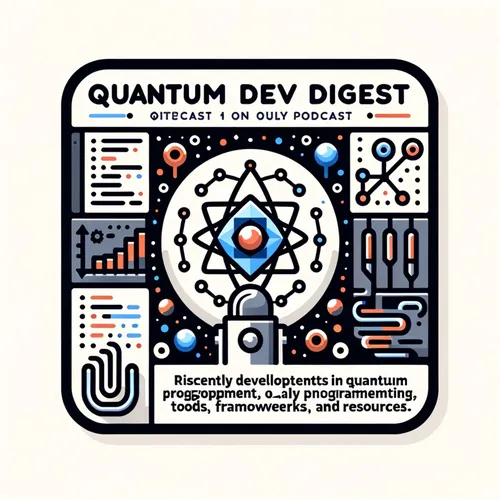Quantum LEGOs: Snapping Together a Modular, Scalable Future | Quantum Dev Digest
- Author
- Quiet. Please
- Published
- Fri 05 Sep 2025
- Episode Link
- https://www.spreaker.com/episode/quantum-legos-snapping-together-a-modular-scalable-future-quantum-dev-digest--67645393
This is your Quantum Dev Digest podcast.
I’m Leo, your resident quantum computing specialist. I’ve spent the last decade immersed in circuits, algorithms, and entanglement, but nothing gets my adrenaline pumping quite like the sound of a discovery echoing through the quantum corridors. Today is September 5, 2025, and this is Quantum Dev Digest.
Here’s the breakthrough that’s turned heads across our global quantum community. Just days ago, researchers at University of Illinois Urbana-Champaign unveiled a modular quantum computer architecture that snaps together—quite literally—like LEGO bricks. Imagine building a quantum system block by block, each module packed with superconducting qubits acting in perfect synchrony. Their experiment clocked in at nearly 99% fidelity, a new record that brings fault-tolerant, scalable quantum computing drastically closer to reality.
Why does this matter? Let’s use an everyday analogy: Picture trying to build a city out of clay—messy, prone to collapse, difficult to expand. Now, swap that clay for LEGO bricks. Suddenly, your city is modular, expandable, and, crucially, reconfigurable. If one part breaks, you swap out a brick, not the whole block. Modular quantum processors let scientists fix, upgrade, and tailor systems as new technology emerges, just as a city planner might redesign a neighborhood for future needs. Wolfgang Pfaff, who led this work, called it “an engineering-friendly way of achieving modularity”—a phrase that will resonate for years.
This matters not just for labs, but for any industry dreaming of quantum advantage—be it optimizing energy grids, simulating molecules for new drugs, or crunching financial portfolios at photonic speed.
And, just as modularity is reshaping hardware, software innovation is racing ahead. A few miles away in Bristol, Phasecraft landed $34 million to make hardware-agnostic quantum algorithms commercially viable. Toby Cubitt and Ashley Montanaro, their visionary co-founders, are crafting quantum solutions that work across architectures; it’s like writing software that runs on any kind of device, freeing industry partners to solve real-world challenges—no matter the quantum hardware in play.
Fittingly, this momentum is sparking a global investment surge. The latest funding for IQM Quantum Computers, over $300 million, is set to expand data center infrastructure and help scale up to a million qubits. Investors are betting big that quantum is ready for prime time.
As I stand in the hum of our own lab, I’m reminded that quantum breakthroughs echo in the current. Just as data centers prepare to welcome quantum machines onto the floor beside AI clusters, society itself is learning to snap together new paradigms—one quantum brick at a time.
So whether you’re coding, designing circuits, or even just planning your next ambitious project, remember: the quantum future is modular, dynamic, and full of possibility.
Thank you for joining me on this vibrant, ever-evolving quantum journey. If you have questions or topics you want discussed on air, just send me an email at [email protected]. Be sure to subscribe to Quantum Dev Digest. This has been a Quiet Please Production. For more information, check out quietplease.ai.
For more http://www.quietplease.ai
Get the best deals https://amzn.to/3ODvOta
